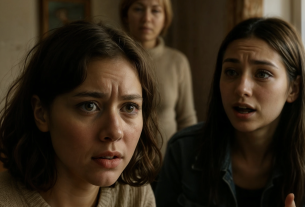Tatiana woke up exactly at 6:45. The daily alarm clock ringing cut through the early morning silence every time — loud, sudden, merciless. She didn’t jump up or plunge immediately into the day’s reality. She simply opened her eyes and lay there for a while, staring at the ceiling, gray from age and constant dampness. Under the blanket it was warm, like inside a womb. Beyond its edge awaited the cold of morning, heavy, felt even through her socks.
Slowly, she lowered her legs onto the floor, sat on the edge of the bed, and took a deep breath. The collar of her sweater hugged her neck like familiar arms but didn’t warm her. The jumper was old, almost a family artifact — smelling of grandmother’s soap and long evenings when it rained outside and her mother read her fairy tales.
Outside, the dawn had not yet become light. It was grayish, uncertain — as if the day hadn’t yet decided whether to appear or remain in the shadows. The kitchen already smelled of oatmeal. That smell always greeted her before she could even enter. There, by the stove, stood her grandmother — small, stooped, but surprisingly composed. Every movement was precise, honed by years. The apron was neatly tied, her hair tucked under a scarf. As if on duty.
“Good morning,” said her grandmother without turning around.
“Uh-huh,” Tatiana replied, lowering herself onto her chair.
The old tablecloth, the cracked porcelain cup, the bowl of oatmeal — all unchanged. Not comfortable, not joyful, but reliable. It was stability, the only thing predictable in their life.
She wrapped herself tighter in the sweater, as if it could protect not only from the cold but also from her thoughts. School again today. Tenth grade. Geography, algebra, physics. The same faces, the same looks. And rare moments — when someone accidentally smiled — were like flashes of light in the gray mass.
Since childhood, she had been told the same thing: her father was a hero. He died before she was born. “He was a real man,” her grandmother would repeat, with something like reverence in her voice. “Just left too early,” her mother added, and in her tone was a pain she never wanted to express aloud.
This image was part of her identity. For a while, it was her shield. At school, if someone asked, “Where’s your dad?” Tatiana could say, “He died.” And then there would be a pause — a bit embarrassed, a bit respectful. As if her father’s name carried an invisible halo. No more mockery, no more questions.
But inside… inside, everything was more complicated.
For Tanya, her father was an image made of fantasies. Tall, broad-shouldered, in military uniform. With a kind but resolute face. He died to save someone. To protect something important. Like in the movies. Heroically. Fearlessly. With a proudly raised head.
“I want to believe,” she repeated to herself, “I must be proud.”
And this image was her armor. But now it was starting to crumble.
After school, she stopped by the store — to buy bread and milk. As usual. She knew which goods were cheaper, where it was more profitable to buy. The saleswoman briefly nodded — a greeting devoid of warmth but understood. Everything happened on autopilot.
At home, she helped her grandmother cut potatoes. Set the table. In the evening — hot food, tea, the radio in the corner rustling news nobody listened to.
But inside, something dark had long been boiling. Something restless. It began with her mother. Lena often grew tired, came home from work with dull eyes. Sometimes she just sat at the edge of the bed, massaging her temples, as if trying to shake off the whole world.
“I’m just tired,” she said.
But one day she fell. Just like that, in the kitchen. The cup shattered with a clatter. Grandmother screamed, Tatiana was the first to rush to her. Mother whispered, “I’m okay,” but her eyes were clouded, her hands trembled.
The diagnosis came quickly. Cold. Cutting off all ways back.
Oncology.
The doctor said the word dryly, as if reading a shopping list. To him — just a patient. To Tatiana — the end of the world.
At first, she didn’t understand. Then came fear. Then shock. Then action.
She stopped being a child. Took life into her own hands. Learned soup recipes, searched for cheap medicine substitutes, sat by her mother’s bedside at night when she had a fever. Got certificates from school, worked weekends, sold old clothes to at least partially cover expenses.
Her classmates talked about boys, parties, TikTok. Tatiana counted pills and checked pain schedules.
When her mother died, she did so quietly. Almost peacefully. Tatiana dozed nearby, her head resting on the blanket. Just woke up — and understood: mother was gone. No screams, no goodbyes. Only emptiness.
The house changed. It became different. Even the air grew heavier. The radio no longer played, the kitchen didn’t smell of favorite dishes. Grandmother did her best, but her voice grew dull, movements slow. They arranged guardianship, gathered documents. Started living “a new way.” As best they could.
Tatiana didn’t cry. She just stared at the ceiling. Listened to the trees scratching the window. Didn’t know what to do with it all.
The morning after all this was just as cold. Her fingers froze, though gloves were in her backpack. But she didn’t take them out. Just walked to school, as always. Shoulders slumped. Without much purpose.
She passed through the lobby, trying not to attract attention. Then Nastya approached her. The same one who usually looked at Tatiana with slight superiority, but today — with something like care. Or rather, pity. That worried Tatiana more than the words themselves.
“Listen…” Nastya began, lowering her voice. “Did you know your father… is alive?”
The word “alive” hit her chest like a bullet. Tatiana froze. The air went out.
“What?” she managed, not recognizing her own voice.
“My mom saw him. Near the fifth pharmacy. He was sitting there. A homeless man. His name is Pavel. She recognized him.”
Each word seemed to enter inside, tearing something whole apart. “Alive.” “Homeless.” “Pavel.” “Not a hero.”
Tatiana looked at Nastya as if she were behind glass. The words reached her with delay. As if this was happening to someone else.
She didn’t remember how she got to class. Didn’t remember sitting down. Everything around blurred. As if she was looking at the world through water.
In the evening, the house greeted her with the smell of potatoes and silence. Grandmother sat in her chair, knitting a pattern no one needed for many years. Tatiana stopped before her. Silent. A minute. Two.
“Is he alive?” she finally whispered. Her voice was low, as if coming from the deepest depths.
Grandmother didn’t raise her eyes. Put the knitting needles on the armrest.
“Did you know?” Her voice trembled. “Did mom know? Did everyone know?”
“Tanya…”
“No!” she shouted. “You lied to me my whole life! About him!”
Svetlana Petrovna straightened as best she could. And spoke — slowly, heavily, with the pain she had held inside for decades:
“Lena was very young. Seventeen. Pavel — older, handsome, persuasive. She fell in love. He went to the army. We waited. Then a letter came. Two sheets of paper. ‘Don’t wait for me. I chose another life.’ That was all.”
Tatiana listened, and something inside her broke.
“Lena went to give birth alone. To another city. Came back — without a man, but with you. They never spoke of him again. I kept silent too. I wanted you to have a hero. I wanted you not to be ashamed.”
“Did he become an alcoholic?” Tanya asked almost in a whisper.
“Yes,” grandmother replied. “At first he disappeared. Then rumors spread. He became… nobody.”
Tatiana stood motionless. Her face turned to stone.
“And you made him a hero.”
“We wanted it to be easier for you. So you wouldn’t be ashamed.”
“Now I’m not ashamed. I’m disgusted.”
“He’s nobody to you, Tanya.”
The phrase hit her harder than she expected.
“But he is… my father.”
In the morning near the store, Tatiana saw him. A man — hunched, shabby. Sunken eyes, tangled beard, a half-empty bottle shaking in his hands. Police were leading him to a service car.
He turned. Their eyes met for just a second. Her heart clenched. It was him.
Tatiana didn’t understand how or why, but felt with all her being — this was Pavel. At home, telling grandmother about it, she heard only a short:
“That’s him.”
No more words, no tears. And inside Tanya, everything screamed. She wanted him to be dead. Honestly. Because death is an end. But he was alive. He was her father. And that destroyed everything left of her former life.
At school, rumors didn’t take long. First, a notebook with a mocking inscription: “Container Princess.” Then a bun on her desk with a note: “Lunch with Dad.” Then open mockery: “Homeless girl,” “Drunk’s daughter,” “Dad in a bottle, mom in the ground.”
Teachers pretended not to notice. Tanya often raised her hand — they ignored her. Answered — were interrupted. The class teacher, once kind and smiling, now spoke coldly:
“Tanya, try not to distract the class.”
The principal, whom grandmother asked to transfer her granddaughter to another school, replied dryly:
“We must consider the psychological climate. Emotionally unstable children disrupt the atmosphere.”
Tatiana listened and repeated to herself: “It’s not my fault.”
But the school whispered to her: “You’re a stigma.”
At home, grandmother coughed more often. The cough was deep, from the chest. Then came doctors, medicine, injections. Money ran out fast.
Tanya started a notebook: where the money went, how much was left. Stopped buying breakfast for herself. Refused new shoes — fixed the old ones.
Her sweater hung loose, worn at the elbows. She rarely washed her hair — saving shampoo. At school, this became a reason for new mockery.
Once someone took a photo of her pulling a piece of bread from her pocket. Caption: “Trash can lunch.” They photographed it and posted it online. The photo spread.
A week later, social services came — a woman and a man, with papers, questions, official phrasing.
“We can offer a safe place. A youth center. Everything official.”
Tatiana looked at them and understood: their care was cold as ice.
“This is not help,” she said. “This is betrayal.”
They left. But before leaving, the woman, young and with clear eyes, turned back:
“You’re strong. It will get better. I believe in you.”
Tanya didn’t answer. Just nodded. But those words became the first anchor holding her after everything collapsed.
A year passed…
Preparations for the graduation were in full swing, especially among those who thought they had the right to celebrate. Almost everyone was on the lists: Nastya — the host, Artyom — in the skit, Olya — reading a letter to parents. And Tatiana? Not a word. Not a hint.
She stood in the corner of the auditorium while others rehearsed. The teacher shuffled papers and only once, as if in passing, said:
“Maybe Tatiana could sing a verse in the song? The one about dad.”
The voice was polite but somehow insincere, as if written beforehand. And in that phrase was pain — because she knew: she was asking the impossible.
Tanya answered quietly but firmly:
“That’s not about me.”
The teacher pressed her lips and turned away again. Then Nastya, as if long waiting for the moment, flared up:
“Of course, it’s not about you! Your dad is a homeless man! And your mom is dead anyway!”
The hall froze. Even the piano someone was playing stopped. For the first time, Tatiana didn’t stay silent.
“Don’t you dare talk about her like that! She was better than all of you! She never abandoned or lied. She lived and loved. And you’re just an empty space.”
Her voice trembled, but not from fear — from the truth she could no longer hold back. She left the hall not because she broke down. But because she no longer wanted to be part of a world — where no one sees, hears, or feels.
After school, Tanya went to her secret place.
The willow by the river had stood there since childhood. Its long branches hung down like the arms of a tired person. She hid there when her mother argued on the phone, when she got a bad grade, when the whole world seemed foreign.
Tanya sat on the protruding roots, hugging her knees.
“I said it. I defended,” she thought. And for the first time in a long time, she didn’t feel broken. On the contrary — collected, as if she had gathered herself anew.
Suddenly, the silence was broken by a scream.
“Help!”
Hoarse, breaking, as if the air was ripping from the deepest depths. Tatiana jumped up. A moment — and her feet slid on the wet grass, her heart pounding as if it wanted to jump out.
“Someone is drowning.” It couldn’t be, it wasn’t just a feeling — it was true.
She kicked off her sneakers in one motion, as if doing it a thousand times, and jumped in.
The cold hit immediately. The water hadn’t warmed yet. Tanya surfaced, looked around. In the distance — a splash, movement. She dived. Something touched her leg — not a log, a person.
Her hands found a wet jacket, hair.
“Hold on!” she breathed out.
“I… can’t…” almost silently.
The water pulled down, the current tore her from her grip. But Tanya didn’t let go.
“If I let go — she’ll die.”
She grabbed the shoulder, pulled her up, started swimming back. Mud, silt, slippery bottom. Strength was leaving. But then — the bottom became firmer. A root under her hand. A little more — and they were on the shore.
Both lay there, breathing fast, broken. Tanya was shaking — not from fear, but from cold and adrenaline. Nearby — a girl, younger than she first seemed. Wet, with a split lip, torn sleeves.
Silence. A minute. Two.
“My name is Maria,” she finally said.
“Tatiana.”
“I just… wanted him to leave me alone.”
Her voice trembled but she no longer cried.
“Who?”
Maria looked up at the sky.
“His name was Anton. We dated. Everything was fine: flowers, movies, walks. But then… yesterday he suddenly changed. Started reading my phone, shouting. Said my dad was a governor, that he owed him something. And I was just a commodity to him.”
Tatiana held her breath.
“And he also said: ‘Your father will sign if he thinks you’re dead.’ Can you imagine?”
“What?”
“Exactly what he said: ‘Dead don’t talk.’ And pushed me into the water.”
Maria spoke calmly, but her voice rang like a blade.
When they entered the apartment, grandmother was sleeping peacefully. Her breathing was barely audible, and the room was lit only by the dim light of the night lamp in the hallway. Maria was standing but trembling. Tatiana silently led her to the kitchen, took an old robe — the very one their mother used to wrap herself in — and handed it to the girl.
On the stove was a teapot. The tea was made by grandmother — strong, black, with a linden aroma. Tanya poured it into cups. Maria pressed hers to her lips, inhaled the steam, and only then took the first sip. Then quietly asked:
“Can I… call?”
Tatiana nodded and brought the phone.
Maria dialed with trembling fingers, held the receiver to her ear.
“Dad… It’s me. I’m alive… Don’t sign anything…”
Pause. Suddenly, a man’s shout burst from the speaker — not anger, but real panic.
“Mashenka?! Where are you?! What’s wrong?! Tell me where you are, I’m coming! Right now!”
She sobbed, repeating again and again: “I’m here… I’m okay…”
Putting down the phone, she didn’t hang up — broken words, instructions, promises were still audible in the receiver. She looked at Tatiana and whispered:
“He’s coming…”
A little more than an hour passed. A car appeared outside — big, strict. A jeep with numbers that weren’t random digits. The door swung open.
Maria stood up. Ran barefoot down the corridor.
He was already waiting on the stairs.
Tall. In a strict coat, under which a flawless suit was visible. But his face… his eyes were wet. Not shining — crying real tears.
“Mashenka…” he whispered and hugged her tightly.
Held her like he could lose her again. Fingers dug into her back, his head buried in her hair. She whispered something to him, and he only shook his head, repeating: “I almost went crazy…”
Then she pulled away. Took a step toward the kitchen and, with a hoarse voice, said:
“It’s her. She saved me.”
The governor approached slowly, as if wanting to remember every detail. First stopped a few steps away, then came closer. Tatiana stood, hands hidden in the sleeves of the robe. Looking at the floor. Not out of shame — simply not knowing what to do with this sudden silence.
He stopped next to her. Nodded. Simply. Not a single unnecessary word. No pomp, no formality. Just a sign. Like recognition. A promise. Like an understanding: I know everything.
There were no journalists, no cameras, no interviews. The world kept moving. But Maria stayed. They became friends — not out of gratitude, not out of duty. Simply because one day someone said: “Hold on,” and the other listened.
Maria started sending messages: “Good morning,” photos of dawn, book covers, recipes, voice messages with cheerful laughter. Sometimes she wrote: “You saved me — now it’s my turn.” It wasn’t an obligation. It was friendship.
At the last bell, Tatiana arrived early. The school corridors were decorated: balloons, ribbons, photos of graduates. Students — with bouquets and smiles, parents — with cameras and joyful fuss.
Tanya stood at the entrance, holding a ribbon. But she felt like an outsider. As if this day was not for her.
She wore a cream-colored dress — soft, flowing, with light waves along the hem. Her hair was curled, slightly messy, like heroines from old movies. Shoes — not high, but elegant. On her wrist — a thin silver bracelet. Nails coated with pastel polish.
All of this — a gift from Maria.
“Let them see who you really are,” she said in the morning.
And they saw.
But no one managed to say a word. Because he entered the door. The governor.
In a strict coat, expensive suit, polished shoes that lightly rang on the floor. He didn’t look around — walked straight to Tatiana. Stopped in front of her. Offered a bouquet of red roses. Kissed her on the cheek. And quietly said:
“You’re not a stranger to me.”
The hall froze. Teachers, classmates, parents — all stood still. Even the music seemed to stop. Tatiana turned and looked at the very girl who once whispered “homeless girl,” threw notes and buns. And smiled. Calmly. Without anger. Without desire for revenge.
“He said I’m not a stranger to him,” she said quietly.
And walked to the exit. Proud. Strong. Unbroken…
“Graduation is not the end. It’s the beginning. The beginning of a new me.”



